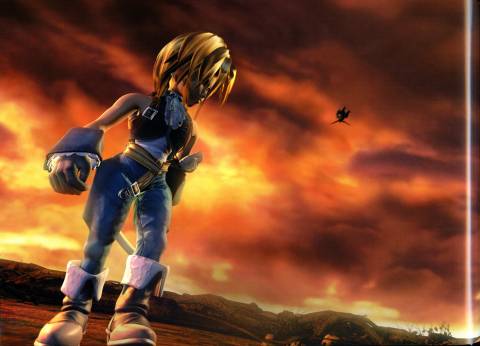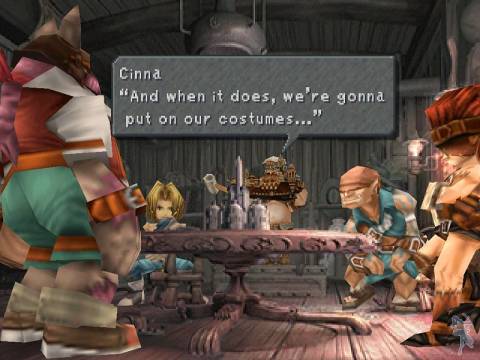Amnesia and Broken Homes: Main Characters in Final Fantasy 8-10 Part 2
By thatpinguino 15 Comments
Yo yo GB, this is the second entry in a series of blog posts that I am doing on the topic of amnesia and broken homes in the final fantasy series. You can read the entry on FFVIII. I am splitting this into three parts: one for FFVIII, one for FFIX and one for FFX. This post will cover FFIX. When I'm done I'll combine the three posts into one gigantopost so that it will be possible to read the whole thing at once, if you are so inclined.
WARNING! SPOILERS FOR ALL OF FFIX. If you haven't played it then go join the hit sensation that is sweeping the nation: FFVIII.
----------------------------------------------------------------------------------------------------------------------------------------------------
If Final Fantasy VIII is a story about inherited destiny and the inescapability of that destiny, then Final Fantasy IX’s story is quite the opposite. FFIX’s story presents the player instead with the power of nurture, rather than nature. It is a story that displays how one’s surroundings and upbringing drastically shape one’s fate. It also champions the human ability to reject a parent’s wishes in favor of a self-determined life path.

Final Fantasy IX’s cast fares a bit better when it comes to the amnesia bug - only the two main characters: Garnet (aka Dagger) and Zidane suffer from amnesia. Both of these characters are also orphans; however, unlike most of the protagonists of FFVIII, Zidane and Garnet are both adopted at a young age. Garnet is adopted by the royal family of the nation of Alexandria, one of the three major world powers in the world of FFIX. Zidane, on the other hand, is adopted by Baku, the leader of a band of thieves that call the nation of Lindblum their home. For the sake of brevity and focus I will only discuss Zidane’s struggles with orphanage and amnesia in this post. However, it is worth noting that Final Fantasy IX’s driving themes are the concept of home, feelings of nostalgia, and finding one’s place in the world, as such I plan to revisit this game some time down the road to delve deeper into this game’s interpretation of the past and its construction of home.
During his time prior to the events of the game, Zidane constantly ponders the home he cannot remember or find. During a moment of calm in the Black Mage Village, Zidane tells Garnet the story of his childhood. During this scene, he says:
Once upon a time......there was a man. There was a man who didn't know where he came from... This man had longed to find his birthplace ever since he was a small child. His birthplace. A place he only remembered in his dreams... He wanted to know more about himself, maybe. About his parents, the house where he was born... One day, the man left and went on a quest to find the answer. His only clue was the blue light he saw in his dreams...
Zidane considered the concepts of origin and home important enough to leave his adoptive family and seek a place whose only certainty is a color. As an orphan, he was unsure how his home and his parents should factor into his life, or if they should even factor in at all. Zidane’s story allows the player to see the hardship of living a life without the context of a past; through Zidane’s eyes the player is allowed to see how critical the traditional ideas of a home and family can seem to someone who has been forced to grow up without either. During his youth it is clear that he initially placed value on the tangible aspects of a home: a birthplace, parents, and a house. He did not, at this point, understand that it is an emotional connection between person and place or person and person that instills meaning in the things we call home. He believed that finding the physical point of one’s origin was to find one’s home, and the emotional closure that comes with it.

The ending of Zidane’s story at the Black Mage Village illustrates for the player how the emotional weight of a home becomes imbued in physical things, and how the symbol of a home is created in the mind of a person. Zidane tells Garnet that after his time searching for his home, he eventually returned to his adoptive father:
What do you think his father did when he came home… The father raised his fist and beat the son he had worked so hard to raise... The father smiled, after beating up his son! Can you believe that? He just gave his son a beating. But this is what the man thought when he saw his father smile... This is my home. This is the place I call home. The man is still looking for his birthplace. But he already has a home. Maybe...
The game does not present the player with the loving reunion of a father and his lost son; it instead complicates the relationship that Zidane has with Baku and Tantalus. Baku’s violence is far from the ideal model of fatherhood; yet, in his smile, Baku reveals that the beating he has just given his son is out of his anger for his son leaving, as well as joy for his son coming back. Baku is not a gentle or a completely honest man, but Zidane and the player can see that he is a good man at his core. It is in this moment of realization that Zidane understands that this sometimes violent and unconventional man and his band of thieves are a crucial part of his home. When Zidane says, “this is the place I call home” he is implicitly restructuring his interpretation of what home is. He first believed that one’s home was defined by one’s biography: home is where you were born, who gave birth to you. In his new interpretation however, Zidane is the agent creating his own home, and home is created when he decides to call a place home. Though Tantalus would not be considered a family by many and their base might not be a true house, both become a part of Zidane’s home because his attachment to them makes them so.
Although it seems as though Zidane understands his home after his story in the Black Mage Village, he does have another moment of doubt when he returns to his place of birth and meets his “father,” Garland. Much of Zidane’s conception of self and home is predicated on his status as an orphan: he was not born into a home, so he made one with Tantalus; his life was not given a purpose, so he made one, first with Tantalus and then again with the main party of FFIX. Yet, almost immediately upon returning to Terra, Zidane is confronted with the answers to his lifelong questions: Where do I come from? What is my purpose? Garland tells Zidane that his purpose in life was to be an “Angel of Death”: he was meant to be the successor to Kuja, the game’s main antagonist. Zidane was created to enact the exact chaos that he spends the entirety of the game fighting. In Zidane’s return home, the developers of the game invert the story of Final Fantasy I. Rather than a hero of light prophesied to defeat the dark knight Garland, Zidane is a puppet created by the evil Garland to destroy the world. Final Fantasy IX takes the narrative of the predestined hero and flips it on its head, revealing that the game’s self-made hero was originally a predestined villain. Ultimately, Zidane rejects the destiny that Garland attempts to impose upon him:
I wouldn't want that kind of power... if I only had a place to call home... My brothers in Tantalus, Vivi, Freya, Amarant, Quina, Steiner, Eiko, and...Dagger... My home is with them in Gaia! If you say I have a motive, then it's to punish all of you who brought pain to my friends! I'll destroy Terra! That's reason enough for my birth here as a Genome!
In the face of his maker, Zidane asserts his own individuality and his own ability to self-determine. Contrary to most Final Fantasy protagonists, Zidane finds his role as a hero because he fervently opposes the powers of fate and destiny, rather than embracing them.
Zidane has one more moment of doubt immediately after his encounter with Garland (one of the more powerful moments of gameplay in the entire game); however, he eventually returns to his senses and continues down his chosen path for the rest of the game. In Final Fantasy IX, we can see that amnesia and orphanage allow for the game to assert that one’s birthplace or destiny need not determine one’s life. The game instead shows how one’s emotional attachments and personal decisions can shape one’s journey and one’s home.
